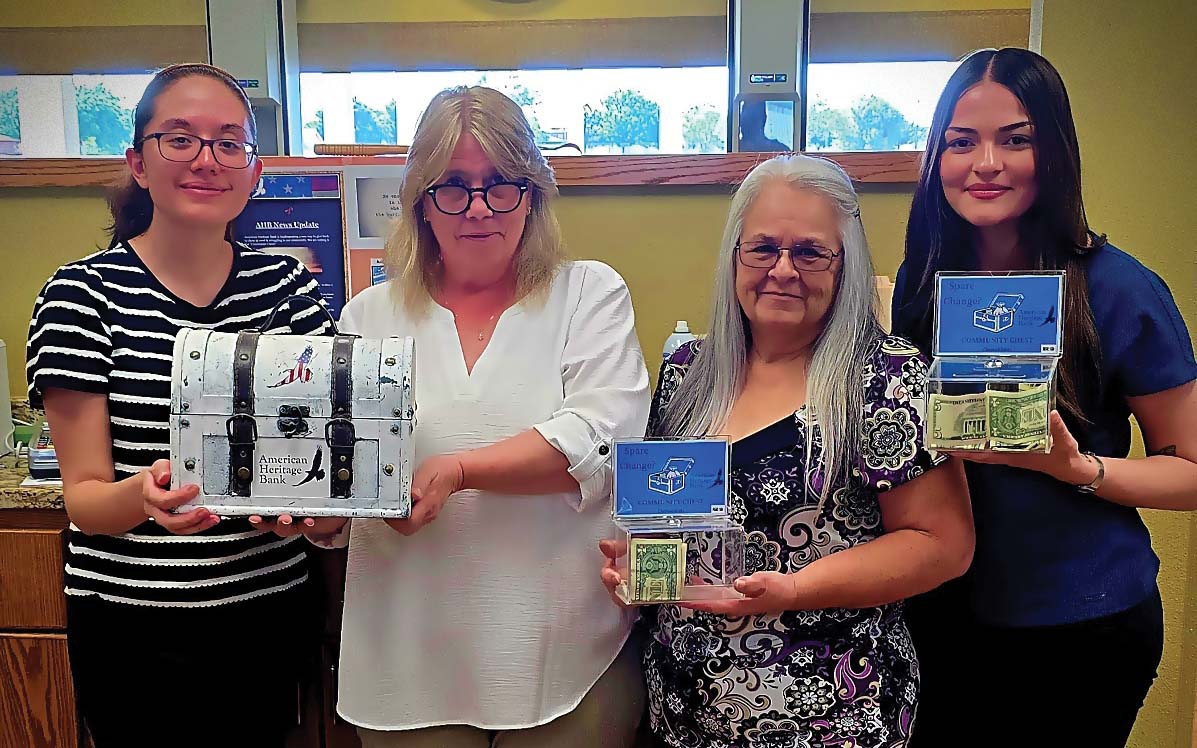From credit union overreach to onerous overregulation, the 2022/23 ICBA board of directors has plenty on its to-do list. Executive committee members tell us what advocacy issues they’ll be focused on during their terms, while board members share their words of wisdom for up-and-coming community bankers: themselves. To sum it up, these leaders are all in and all heart for community banking.
The ICBA 22/23 executive committee is all in
April 01, 2022 / By Molly Bennett
From credit union overreach to onerous overregulation, the 2022/23 ICBA board of directors has plenty on its to-do list. Executive committee members tell us what advocacy issues they’ll be focused on during their terms, while board members share their words of wisdom for up-and-coming community bankers: themselves. To sum it up, these leaders are all in and all heart for community banking.
When the 2022/23 ICBA board of directors was introduced at ICBA LIVE in San Antonio, Texas, there was a palpable sense of excitement in the air. Here stood a group of experienced and passionate community bankers who have dedicated themselves to advocating for the industry they care so deeply about.
“I’m so inspired by the professionalism, integrity and commitment of our executive committee and board of directors as we work together to serve the needs of community bankers across the nation,” says Terry Jorde, ICBA senior executive vice president and chief of staff.
ICBA president and CEO Rebeca Romero Rainey echoes this sentiment. “I’m looking forward to working with our executive committee and board of directors over the next year,” she says, “as we serve ICBA’s mission to create and promote an environment where community banks flourish.”
Let’s hear from the executive committee members themselves about how—and why—they’re all in for community banking.

ICBA executive committee (from left)
Vice chairman Lucas White, President, The Fountain Trust Co., Covington, Ind.
Treasurer Sarah Getzlaff, CEO, Security First Bank of North Dakota, New Salem, N.D.
Secretary Tim Aiken, President and CEO, Union Bank Inc., Middlebourne, W.Va.
Chairman-elect Derek Williams, President and CEO, Century Bank & Trust, Milledgeville, Ga.
Past chairman Preston Kennedy, President and CEO, Zachary Bancshares, Inc., Zachary, La.
Chairman Brad M. Bolton, President/CEO/senior lender, Community Spirit Bank, Red Bay, Ala.
Consolidated holdings chair Jack Hartings, Chairman, The Peoples Bank Co., Coldwater, Ohio
ICBA president and CEO Rebeca Romero Rainey, Washington, D.C.
Immediate past chairman Robert Fisher, President and CEO, Tioga State Bank, NA, Spencer, N.Y.
Past chairman Noah Wilcox, President, CEO and chairman, Grand Rapids State Bank and Wilcox Bancshares Inc., Grand Rapids, Minn.; and CEO and chairman, Minnesota Lakes Bank, Delano, Minn.
Q: What do you think the biggest advocacy challenges will be during your term?
Brad M. Bolton: Examining the implementation of Section 1071 will be critical. We’ll also be paying close attention to and reiterating our advocacy positions on climate risk assessments, overdraft protection and any further regulatory burdens. The key is to demonstrate how additional regulatory burdens on the community banking industry will negatively affect the customers and communities we serve. This is why sharing our customer stories is so important.
Derek Williams: My biggest concern is the Consumer Financial Protection Bureau’s (CFPB) Small Business Data Collection rule and its potential negative impact on our ability to meet legitimate small business borrowing needs, including additional costs and privacy issues. We must also keep our focus on protecting the 2017 tax cuts and, as always, monitoring and confronting credit union overreach.
Lucas White: We need to continue to differentiate community banks and educate policymakers on why tiered and proportionate regulation is necessary. We are not Wall Street banks—we are community banks. Everyone saw during the financial crisis, and throughout the pandemic, how different community banks are from the too-big-to-fail banks. We need to make sure people remember that and have it reflected in laws and regulations that affect our industry.
Sarah Getzlaff: I believe our biggest challenge continues to be distinguishing community banks from Wall Street banks. In 2022, this distinction will be especially important with Section 1071 and overdraft reform looming. We need to push the CFPB to recognize that one-size-fits-all regulation doesn’t make sense for our industry and the communities we serve.
“It’s an honor to work with them as we focus on advocacy, education and innovation for the community banking industry. Their insights are critical to the path we chart for this great industry.”
—Terry Jorde, Senior executive vice president and chief of staff, ICBA
Tim Aiken: In no particular order: the continued exploitation of the tax exemption for/by credit unions, the concern that policymakers will use their regulatory oversight powers to choke off credit for fossil fuel-related business, relief from small business loan data collection, and staving off any additional IRS reporting on customer activities.
Robert Fisher: Some of the key advocacy challenges include nonsufficient funds/overdraft fees and limits, potential climate-focused disclosures, lack of guidance/clarity as it relates to cannabis banking, IRS data collection (which we need to continue to watch and fight), public bank initiatives, credit union subordinated debt and tax subsidy, and Small Business Administration (SBA) direct lending. We are also challenged with ever-increasing cybersecurity threats and CFPB overreach that need to be assessed and addressed.
Noah Wilcox: We need to continue to be on the offensive with our advocacy wins while playing defense in this current regulatory environment. We must continue to fight increased regulation, specialty charter considerations and the potential for more fintech access to traditional rails without the same oversight. Section 1071 data collection requirements and the IRS proposed data collection rules will also continue to be a focus.
Preston Kennedy: We must continue to push back on overreach by credit unions, the Farm Credit System and climate assessment proposals. Community bankers have always had an interest in assessing their risks, because it’s an inherent part of our business model. We must preserve and protect the ability to do just that.
Jack Hartings: I see the biggest advocacy challenges as educating the new agency heads, their staff and the current administration to the community banking business model and the value it brings to the fabric of our nation. It’s too easy to create one-size-fits-all rules that directly conflict with community banks serving their customers in their communities. This is why we must all advocate and share our customer stories with policymakers, so they understand that our business model is unique. Recent proposals for collecting data on consumers and small businesses bog down the process and drive up unnecessary cost for all customers.

ICBA at-large directors (from left)
At-large director Mark Hesser, President, Pinnacle Bancorp Inc., Omaha, Neb.
At-large director Brenda Foster, Chairman, president and CEO, First Western Bank & Trust, Minot, N.D.
At-large director Doug Ouellette, Chief community banking officer, Mercantile Bank of Michigan, Grand Rapids, Mich.
At-large director Jill Sung (not pictured), President and CEO, Abacus Federal Savings Bank, New York City
Q: Are there any other opportunities you’d like to highlight?
Bolton: Passing the Enhancing Credit Opportunities in Rural America Act (H.R. 1977/S. 2202) (ECORA) and SAFE Banking Act would be a big win for our communities. Also, waking up policymakers to the negative effect of the credit union industry and showing that it should be subject to taxation and CRA requirements will continue to be at the forefront of our advocacy issues. In addition, closing the ILC (Industrial Loan Corporation) loophole to keep another uneven playing field from being created is critical.
Williams: As the too-big-to-fail banks continue to consolidate and drive away customers, community banks have a great opportunity to further solidify our stellar reputation with policymakers for the way we consistently and effectively meet consumer and small business banking needs. This opens the door for some huge advocacy opportunities in the coming years, but we must continue to tell our customer stories and showcase the community banking difference.
White: We have a real opportunity to draw attention to credit unions and how far they have strayed from their original mission. Nobody can argue with a straight face that credit unions should be buying banks.
Getzlaff: I think our biggest opportunity lies in our ability to tell our story and the stories of our customers. I look forward to getting back in front of our regulators, senators and representatives for face-to-face visits to rebuild personal connections and gain their support during this year’s ICBA Capital Summit.
Aiken: Advocacy-wise, I feel as if we are mostly playing defense at present. However, sometimes playing defense leads to opportunities, and we need to be prepared. For instance, ICBA is calling for congressional hearings on the credit union tax exemption. At some point, that is going to happen, and when it does, we will have the opportunity to go on offense.
Fisher: I believe the pandemic has forever altered the way people want to bank, so we all need to up our game when it comes to mobile and digital offerings. This creates many opportunities for community banks as we continue to foster relationships that are high-tech and high-touch. I believe that partnerships with community bank-focused fintechs is critical to our success, which is why the ICBA ThinkTECH Accelerator is so critical.
Wilcox: Our strong reputation provides an opportunity for community bankers to shape the landscape for the benefit of our industry and the communities we serve, whether that is working with the administration on appropriate and qualified nominees for key positions, working to limit additional onerous reporting or supporting the SAFE Banking Act. In addition, the ICBA ThinkTECH Accelerator is one of the best fintech accelerators you will find. It provides solutions tailored for community banks and is a real asset to our industry.

ICBA standing committee chairs (from left)
Policy Development chair Quentin Leighty, President and CFO, First National Bank of Monument, Las Animas, Colo.
Bank Operations and Payments chair Alice P. Frazier, President and CEO, Bank of Charles Town, Charles Town, W.Va.
Bank Services chair Mike Burke, President, ChoiceOne Bank, Sparta, Mich.
Bank Education chair Kathy Underwood, President and CEO, Ledyard National Bank, Hanover, N.H.
ICBPAC chairman Shon Myers, Chairman, President and CEO, Farmers & Merchants Bank, Miamisburg, Ohio
Kennedy: The modernization of the Community Reinvestment Act and the passage of common-sense cannabis banking regulation will be critical to our industry this year. We must work together and make our individual and powerful voices heard through ICBA’s grassroots advocacy.
Hartings: ICBA’s ThinkTECH Accelerator brings fintechs and community banks together to enhance bank operations and the customer experience. Its uniqueness is that it provides community banks with choice. There are multiple fintech solutions designed specifically for our industry, yet it recognizes that not every solution will be of equal value to every independent community bank.
Q: What are your personal goals for your term?
Bolton: I hope to energize a renewed passion for our great community banking industry. I hope to inspire senior leaders to train up the next generation of leaders that will lead our industry and association in the years to come. We must find ways for community banks to remain independent and become community continuators.
Williams: I plan to work hard to effectively represent the thousands of community bankers across our nation and to motivate and encourage them to partner with ICBA to help protect our industry and our ability to serve our customers and our communities. I also want to be a positive support for our talented and hardworking ICBA staff.

White: I want to have fun, meet as many community bankers as I can and demonstrate why ICBA is the only national association that makes sense for community bankers. I have a passion for community banking, and I love what I do for a living. I want to share that with others.
Getzlaff: I always say if I have an opportunity to participate and I pass it up, I pass up my right to complain. I plan to use my term as an opportunity to advocate for a level playing field where community banks can compete fairly and aren’t regulated into consolidation, and where my kids have an opportunity to be the fourth-generation leaders of our bank.
Aiken: I want to learn more about fintech opportunities, represent ICBA at some state association meetings, advocate for community banking at state and federal levels, and provide valuable guidance and support to ICBA.
Fisher: My term as chairman has come to a close, but I’m here to support Brad and his efforts during his year as chairman. I will also emphasize the importance of financial literacy and our need to engage and connect through all communications channels, but especially on social media.
Wilcox: I look forward to continuing my work to support our executive committee, our advocacy objectives, and perhaps most importantly, my passion project of helping more bankers engage in advocacy. When I say engage, I mean helping them understand the importance of their personal involvement and ultimately getting them to the point where they can develop personal relationships with the members in their state.
Kennedy: With the start of more in-person meetings, I look forward to face-to-face meetings with community bankers I have met only through social media or on virtual calls.
Hartings: I’m looking forward to more community banker engagement! This includes engagement in advocacy but also in the host of solutions ICBA offers. With tight net interest margins and rising costs in 2022, community banks will need to take advantage of ICBA offerings like Community Banker University, Preferred Service Providers, the ThinkTECH Accelerator and ICBA subsidiaries’ solutions such as Bancard, TCM, Securities and Reinsurance to continue to thrive.
The benefit of hindsight
If board members could give their 22-year-old selves advice, here’s what they’d say:
Find a career that provides an intellectual challenge, allows you to honestly and genuinely help people, and one that makes you proud of what you do, knowing that you earn people’s trust and respect. That is what I found in community banking.—Tim Zimmerman, ICBA past chairman and senior vice president and COO of standard Bank, FSB, Monroeville, Pa.
Watch and listen to successful community bankers and soak up all of their advice and wisdom. There is so much to gain, and the fundamentals of good banking never change. Technology changes our processes, but the way we build relationships in our communities never changes.—Scott Heitkamp, ICBA past chairman and president and CEO of Valuebank Texas, Corpus Christi, Texas
Slow down and have better work-life balance. I missed a lot of my kids’ events because I had “too much going on at work.” Work life/home life balance is so important.—Doug Ouellette, ICBA at-large director
Learn much, give back, and there is no “I” in team.—Brenda Foster, ICBA at-large director
Work hard and put in more effort than those around you.—Mark Hesser, ICBA at-large director
Collect a mentor from every job you have.—Jill Sung, ICBA at-large director
Subscribe now
Sign up for the Independent Banker newsletter to receive twice-monthly emails about new issues and must-read content you might have missed.
Sponsored Content
Featured Webinars
Join ICBA Community
Interested in discussing this and other topics? Network with and learn from your peers with the app designed for community bankers.
Subscribe Today
Sign up for Independent Banker eNews to receive twice-monthly emails that alert you when a new issue drops and highlight must-read content you might have missed.
News Watch Today

Join the Conversation with ICBA Community
ICBA Community is an online platform led by community bankers to foster connections, collaborations, and discussions on industry news, best practices, and regulations, while promoting networking, mentorship, and member feedback to guide future initiatives.













